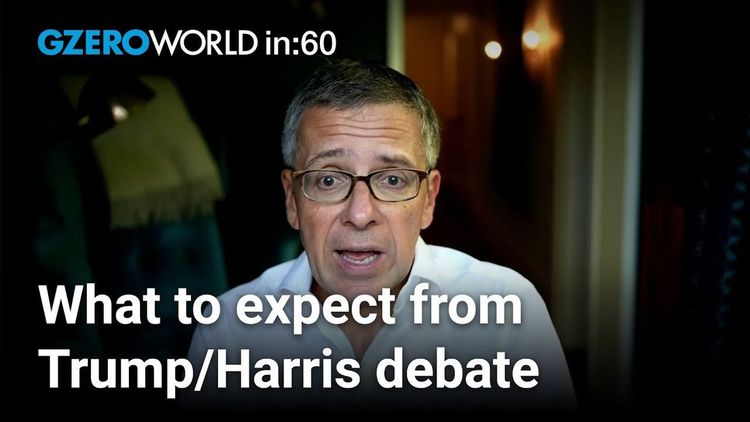Trump-Harris debate: What to expect

This week on World In :60, Ian Bremmer offers his perspective on international politics.
What topics are likely to take center stage in the Trump/Harris debate?
It's clear that topics like the economy, immigration, and abortion are at the forefront of everyone’s minds. Personally, I’m more focused on global matters and foreign policy, such as climate change, the governance of artificial intelligence, and issues involving the Middle East, China, and Russia. However, I suspect these topics receive limited attention and have little sway over undecided voters. Still, I believe this election is less about these specific issues and more about how Harris stacks up against Trump, and the other way around. Also, considering how selective people's information sources are, if one candidate narrowly wins, both sides are likely to claim a decisive victory over the other, and their supporters will echo that sentiment.
There really needs to be either a significant blunder or a remarkable success for someone to stand out in what is a very close competition. That's what everyone is anticipating, especially since Harris hasn't faced pressure like this previously, while Trump's recent public appearances have been erratic and reflect his age. I believe people are eager to see how Harris handles this major challenge and whether Trump can still provide captivating moments in this type of setting. That’s the current situation. Tonight, everyone will be watching. I expect the audience in the U.S. will exceed 50 million. This is set to be a crucial and highly publicized event, especially with just two months left until the election.
As Edmundo Gonzalez pursues refuge in Spain, what does the future hold for Venezuela and the opposition to Maduro?
The fact that the U.S. has seized one of Maduro's planes highlights the failure of their strategy to persuade the Venezuelan government to conduct a fair election. It was unrealistic to think that any outside force—be it the Americans, Colombians, Brazilians, or Mexicans—could bring about change. Unfortunately, Venezuela's opposition hasn't been able to make a significant impact either. This means that the military remains firmly behind Maduro, despite his highly corrupt regime and the fraudulent elections that have kept him in power. The situation is bleak. If Gonzalez hadn't escaped the country, he would likely have been arrested. The military and the president were more than willing to let him go, providing clear warnings that he needed to leave or face imprisonment. He chose to flee, and it seems that many are resigned to this outcome. However, it creates a dire situation for the Venezuelan people, with millions of them likely seeking refuge in neighboring countries like the United States and Colombia.
What was the reaction to Mario Draghi's report on the competitiveness of the EU?
The response has been positive because Europe isn't investing in competitiveness and industrial policies like the U.S. and China do. As a result, they are falling behind in technology. Additionally, Europe isn't allocating enough resources for security, which means they remain heavily reliant on the United States. Draghi is urging Europeans to step up their efforts, but there is a lack of internal leadership to bring about this change. They also lack the financial flexibility and the necessary coordination, even within a robust European Union. While Draghi's ideas are appreciated, it seems unlikely they will be put into action. That's the situation we're in. We admire Draghi, but he's not in charge of the EU.















































